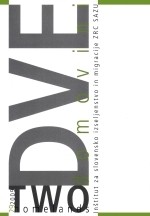Objects, Scents and Tastes from a Distant Home: Goan Life Experiences in Africa
Keywords:
materiality, home, migration, colonialism, GoaAbstract
This paper reviews part of the outcome of a research project based on the life narratives of a group of Goan Brahmin families with a common past: a long life experience in colonial Mozambique, followed by a forced exodus to Portugal after its independence. The families´ life experiences were explored via the discussion of their past homes, their material culture and domestic consumption practices, which proved to be a positive contribution to revealing significant features of their position in the former colonial system.
Downloads
References
Almeida, M. Vale de (2002). Longing for Oneself: Hybridism and Miscegenation in Colonial and Postcolonial Portugal. Etnográfica, VI (1), 181–200.
Bastos, C. (2002). The Inverted Mirror: Dreams of Imperial Glory and Tales of Subalternity from the Medical School of Goa. Etnográfica, VI (1), 59–76.
Basu, P. & Coleman, S. (2008). Introduction : Migrant Worlds, Material Cultures. Mobilities, 3 (3), 313–330.
Baumannn, G. (2003). Contesting Culture. Discourses of Identity in Multi-Ethnic London. Cambridge: Cambridge University Press.
Bhabha, H. K. (2002). The Locations of Culture. London: Routledge.
Bourdieu, P. (1979). La Distinction, Critique Sociale du Jugement. Paris: Minuit.
Brah, A. (1998). Cartographies of Diaspora. London: Routledge.
Braziel, J. E. & A. Mannur (2003). Nation, Migration, Globalization: Points of Contention in Diaspora Studies. Theorizing Diaspora (eds.J. E.Braziel and A. Mannur). Oxford: Blackwell, 1–22.
Desai, N. (2000). The Denationalisation of Goans. An Insight into the Construction of Cultural Identity. Lusotopie, 469–476.
Fortier, A. (2000). Migrant Belongings: Memory, Space, Identity. Oxford: Berg.
Gardner, K. (2002). Age, Narrative and Migration. The Life Course and Life Histories of Bengali Elders in London. Oxford: Berg.
Gracias, F. S., (2000). Goans Away From Goa. Migration to the Middle East. Lusotopie, 423–432.
Hall, S. (2000). Who Needs Identity? Identity: A Reader (eds. P. Du Gay, J. Evans and & P. Redman). London: Sage, 15–30.
Hall, S. (2003). Cultural Identity and Diaspora. História da Expansão Portuguesa (eds. Braziel, J. E. and A. Mannur). Lisboa: Circulo de Leitores, 5, 216–274.
Harbottle, L. (1996). ‘Bastard’ Chicken or Ghormeh-Sabzi?: Iranian Women guarding the Health of the Migrant Family. Consumption Matters (eds. Edgell, S., Hetherington, K. and Warde, A.). Oxford: Blackwell, 204–226.
Miller, D. (1998). Why Some Things Matter. Material Cultures: Why Some Things Matter, (ed. Miller, D.). London: The University of Chicago Press, 3–21.
Miller, D. (2001a). Behind Closed Doors. Home Possessions. Material Culture Behind Closed Doors (ed. Miller, D.). Oxford: Berg, 1–19.
Miller, D. (2001b). Possessions. Home Possessions. Material Culture Behind Closed Doors (ed. Miller, D.). Oxford: Berg, 107–121.
Miller, D. (2008). The Comfort of Things. London: Polity Press.
Morley, D. (2000). Home Territories: Media, Mobility and Identity. London: Routledge.
Myers, F. (2001). Introduction: The Empire of Things. The Empire of Things. Regimes of Value and Material Culture (ed. Myers, F.). Santa Fe: School of American Research Press, 361.
Petridou, E. (2001). The Tastes of Home. Home Possessions. Material Culture Behind Closed Doors (ed. Miller, D.). Oxford: Berg, 87–104.
Sardo, S. (2004). Guerras de Jasmim e Mogarim. Música, Identidade e Emoções no Contexto dos Territórios Pós-Coloniais Integrados. O Caso de Goa. Dissertação de Doutoramento, Universidade Nova de Lisboa. Lisboa: mimeo.
Thomaz, L. F. (1998). De Ceuta a Timor. Algés: Difel.
Zamparoni, V. (2000). Monhés, Baneanes, Chinas e Afro-maometanos. Colonialismo e Racismo em Lourenço Marques, Moçambique, 1890–1940. Lusotopie, 191–222.
Downloads
Published
How to Cite
Issue
Section
License

This work is licensed under a Creative Commons Attribution-NonCommercial-NoDerivatives 4.0 International License.
Authors guarantee that the work is their own original creation and does not infringe any statutory or common-law copyright or any proprietary right of any third party. In case of claims by third parties, authors commit their self to defend the interests of the publisher, and shall cover any potential costs.
More in: Submission chapter





